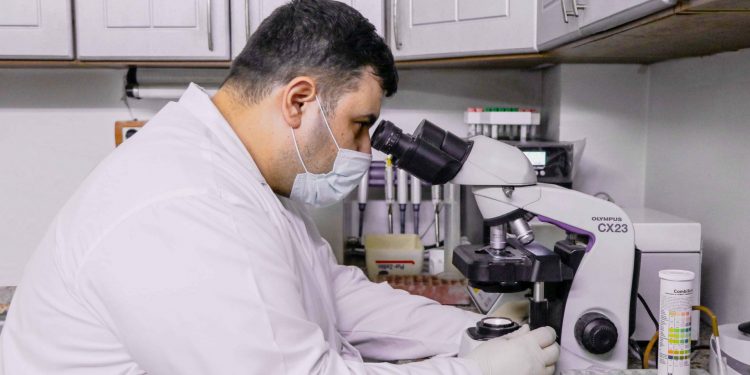Cancer is a disorder in which cells lost the ability to control their growth rate
It is well-known that early detection of cancer is critical to meeting the survival ambition, as it means patients can receive treatment when there is a better chance of achieving a complete cure. Recognizing the possible alarming and warning signs and taking prompt action against them leads to early diagnosis, and get successfully treated. So, what are the alarming and warning signs that urge us to seeing a doctor
The warning signs that urge us to seeing a doctor
Some signs and symptoms might be an early alarm to having cancer, but they are not a crucial proof to having it. However, one shouldn’t ignore the following symptoms: Fatigue, dizziness, unintended weight loss, loss of appetite, fever, coughing, and the function disorder of some body’s organ.
The Symptoms …Raising awareness on the symptoms decrease the complications
Brain Cancer: Headaches, seizures or convulsions, personality or behavior changes,
Mouth cancer: Bleeding or numbness in the mouth, swelling or a sore on your lip that won’t heal, difficult or painful swallowing, a growth or lump inside your mouth
Nasopharyngeal carcinoma: Nasal congestion or ringing in your ears, taste disorder.
Throat cancer: Changes in the voice, such as hoarseness or not speaking clearly
Difficulty swallowing, ear pain, a lump or sore that doesn’t heal, a sore throat.
Thyroid cancer: A lump that can be felt through the skin on your neck, changes to the voice (including increasing hoarseness), difficulty swallowing, pain in your neck and
Esophageal cancer: Difficulty swallowing (dysphagia), weight loss without trying, chest pain, pressure or burning, worsening indigestion or heartburn, coughing or hoarseness.
Lung cancer: A new cough that doesn’t go away, coughing up blood, even a small amount, shortness of breath, chest pain, clubbed fingers. Smoking and air pollution cause the majority of lung cancers.
Breast Cancer: Breast cancer can occur in both men and women, but it’s far more common in women. A breast lump or thickening that feels different from the surrounding tissue. Signs to breast cancer may include: change in the size, shape or appearance of a breast, changes to the skin over the breast, such as dimpling, a newly inverted nipple, peeling and scaling.
Frequent screening is essential for: aging women, girls whose periods began before age 12, women who have been exposed to radiation, alcoholic women.
Stomach cancer: difficulty swallowing, feeling bloated after eating, feeling full after eating small amounts of food, heart burn, indigestion, nausea, stomach pain, vomiting, unintentional weight loss. The factors that increase the risk of stomach cancer include:
A diet high in salty and smoked foods, a diet low in fruits and vegetables, infection with Helicobacter pylori, long-term stomach inflammation (gastritis), smoking and stomach polyps. But the existence of these symptoms is not enough to confirm the presence of the cancer.
Kidney cancer: Blood in your urine, which may appear pink or red, pain in the back or side that doesn’t go away, loss of appetite, unexplained weight loss, tiredness, fever
Liver cancer: Yellow discoloration of the skin and the whites of the eyes (jaundice), upper abdominal pain, general weakness and fatigue.
Pancreatic cancer: Pain, yellow discoloration of the skin and the whites of the eyes (jaundice).
Rectal cancer: A change in bowel habits, such as diarrhea, constipation or more-frequent bowel movements. Dark maroon or bright red blood in stool. A feeling that the bowel doesn’t empty completely. Abdominal pain
Leukemia: Fever or chills, persistent fatigue, weakness, frequent or severe infections, losing weight without trying, swollen lymph nodes, enlarged liver or spleen, easy bleeding or bruising, recurrent nosebleeds, tiny red spots in your skin, excessive sweating, especially at night, bone pain or tenderness.
Lymphoma (Hodgkin’s disease): Painless swelling of lymph nodes in the neck, persistent fatigue, fever, night sweats, shortness of breath, unexplained weight loss, itchy skin.
Bone cancer: Swelling and tenderness near the affected area, weakened bone, leading to fracture, fatigue, unintended weight loss
Multiple myeloma: Bone pain,(especially in your spine or chest), nausea, constipation, loss of appetite, mental fogginess or confusion, fatigue, frequent infections, weight loss, weakness or numbness in your legs, excessive thirst
Endometrial cancer: Vaginal bleeding after menopause, bleeding between periods, pelvic pain.
Cervical cancer: Vaginal bleeding after intercourse, between periods or after menopause, watery, bloody vaginal discharge that may be heavy and have a foul odor, pelvic pain or pain during intercourse
Skin cancer: A pearly or waxy bump, A flat, flesh-colored or brown scar-like lesion, A bleeding or scabbing sore that heals and returns.
Melanoma signs include: A large brownish spot with darker speckles, A mole that changes in color, size or feel or that bleeds. A small lesion with an irregular border and portions that appear red, pink, white, blue or blue-black. A painful lesion that itches or burns. Dark lesions on palms, soles, fingertips or toes, or on mucous membranes lining mouth, nose, vagina or anus.
Prostate cancer: Trouble urinating, decreased force in the stream of urine, blood in the urine, blood in the semen, bone pain, erectile dysfunction.
Testicular cancer: A lump or enlargement in either testicle, a feeling of heaviness in the scrotum, a dull ache in the abdomen or groin, a sudden collection of fluid in the scrotum, pain or discomfort in a testicle or the scrotum, enlargement or tenderness of the breasts, back pain
Having these symptoms mean that I have a cancer?
The presence of these symptoms is not a crucial proof to having cancer. Only doctors can diagnose the cancer existence after physical examinations, screening and laboratory tests.


